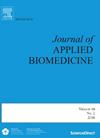黑草和百里醌对内皮细胞活化和单核细胞粘附的体外研究。
IF 2
4区 医学
Q3 MEDICINE, RESEARCH & EXPERIMENTAL
引用次数: 0
摘要
简介:百里醌(Thymoquinone, TQ)是黑草(Nigella sativa, NS)中的一种生物活性化合物。也被称为黑籽/孜然,它被认为具有抗动脉粥样硬化的特性。然而,关于NS油(NSO)和TQ对动脉粥样硬化的影响的研究仍然很少。本研究的目的是检测人冠状动脉内皮细胞(HCAECs)中细胞间粘附分子-1 (ICAM-1)、血管细胞粘附分子-1 (VCAM-1)和内皮-白细胞粘附分子(e-选择素)的基因和蛋白表达。方法:用200µg/ml脂多糖(LPS)和不同浓度的NSO(55、110、220、440µg/ml)或TQ(4.5、9.0、18.0、36.0µm)刺激hcaec 24 h。采用多基因法和ELISA法分别检测NSO和TQ对基因和蛋白表达的影响。采用Rose Bengal法分析单核细胞结合活性。结果:NSO和TQ显著降低ICAM-1和VCAM-1基因及蛋白表达。TQ对生物标志物的还原活性呈剂量依赖性。与未处理的hcaec相比,NSO和TQ预处理24小时显著降低了hcaec的单核细胞粘附性。结论:补充NSO和TQ具有抗动脉粥样硬化特性,并通过下调ICAM-1表达抑制单核细胞对hcaec的粘附。NSO有可能被纳入标准治疗方案,以预防动脉粥样硬化及其相关并发症。本文章由计算机程序翻译,如有差异,请以英文原文为准。
In vitro study of Nigella sativa and thymoquinone activity on endothelial activation and monocyte adhesion.
INTRODUCTION Thymoquinone (TQ) is one of the bioactive compounds in Nigella sativa (NS). Also known as black seeds/cumin, it has been postulated to possess anti-atherogenic properties. However, research on the effects of NS oil (NSO) and TQ on atherogenesis remain scarce. The aim of this study is to determine gene and protein expression of Intercellular Adhesion Molecule-1 (ICAM-1), Vascular Cell Adhesion Molecule-1 (VCAM-1), and Endothelial-eukocyte adhesion molecule (E-selectin) in Human Coronary Artery Endothelial Cells (HCAECs). METHODS HCAECs were stimulated for 24 hours (h) with 200 µg/ml of Lipopolysaccharides (LPS) and different concentrations of NSO (55, 110, 220, 440 µg/ml) or TQ (4.5, 9.0, 18.0, 36.0 µm). The effects of NSO and TQ on gene and protein expressions were measured using multiplex gene assay and ELISA assay, respectively. Rose Bengal assay was used to analyse monocyte binding activity. RESULTS NSO and TQ significantly reduced ICAM-1 and VCAM-1 gene and protein expressions. TQ showed significant reduction activity of the biomarkers in dose dependent manner. HCAECs pre-treated with NSO and TQ for 24 h significantly lowered monocytes adherence compared to non-treated HCAECs. CONCLUSIONS NSO and TQ supplementation have anti-atherogenic properties and inhibit monocytes' adherence to HCAECs via down-regulation of ICAM-1 expression. NSO could potentially be incorporated in standard treatment regimens to prevent atherosclerosis and its related complications.
求助全文
通过发布文献求助,成功后即可免费获取论文全文。
去求助
来源期刊

Journal of applied biomedicine
PHARMACOLOGY & PHARMACY-
CiteScore
2.40
自引率
7.70%
发文量
13
审稿时长
>12 weeks
期刊介绍:
Journal of Applied Biomedicine promotes translation of basic biomedical research into clinical investigation, conversion of clinical evidence into practice in all medical fields, and publication of new ideas for conquering human health problems across disciplines.
Providing a unique perspective, this international journal publishes peer-reviewed original papers and reviews offering a sensible transfer of basic research to applied clinical medicine. Journal of Applied Biomedicine covers the latest developments in various fields of biomedicine with special attention to cardiology and cardiovascular diseases, genetics, immunology, environmental health, toxicology, neurology and oncology as well as multidisciplinary studies. The views of experts on current advances in nanotechnology and molecular/cell biology will be also considered for publication as long as they have a direct clinical impact on human health. The journal does not accept basic science research or research without significant clinical implications. Manuscripts with innovative ideas and approaches that bridge different fields and show clear perspectives for clinical applications are considered with top priority.
 求助内容:
求助内容: 应助结果提醒方式:
应助结果提醒方式:


